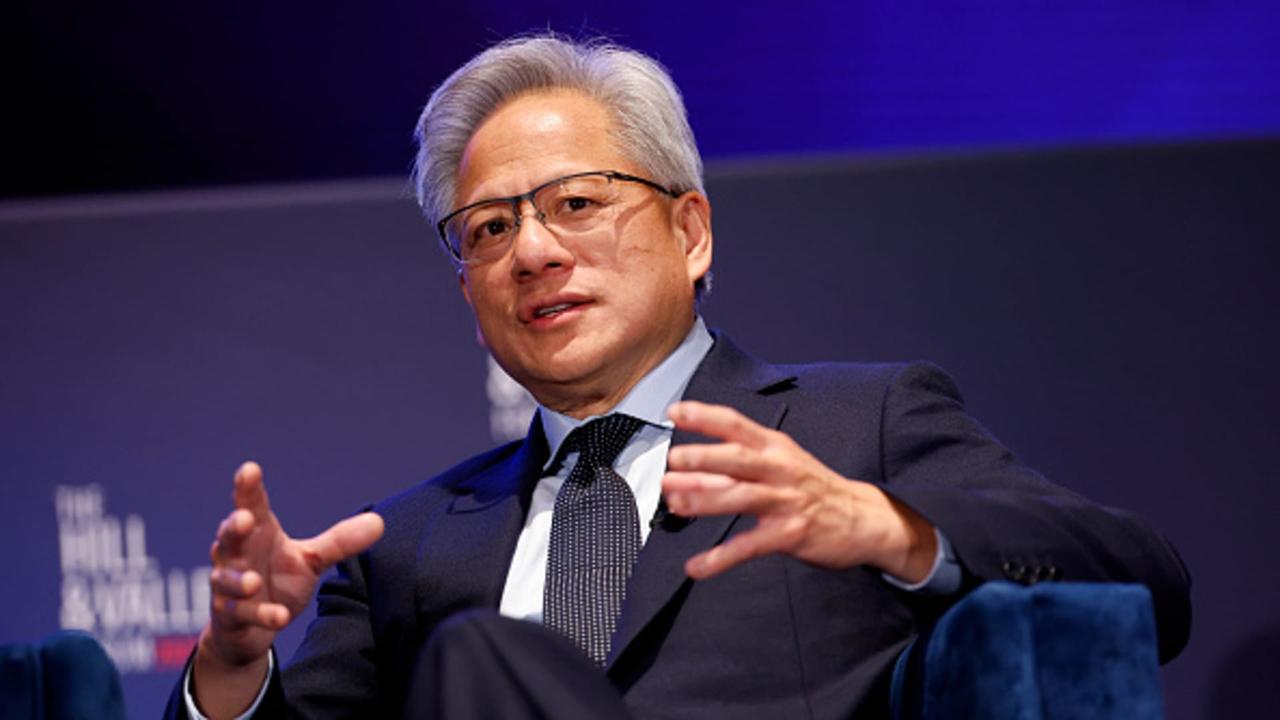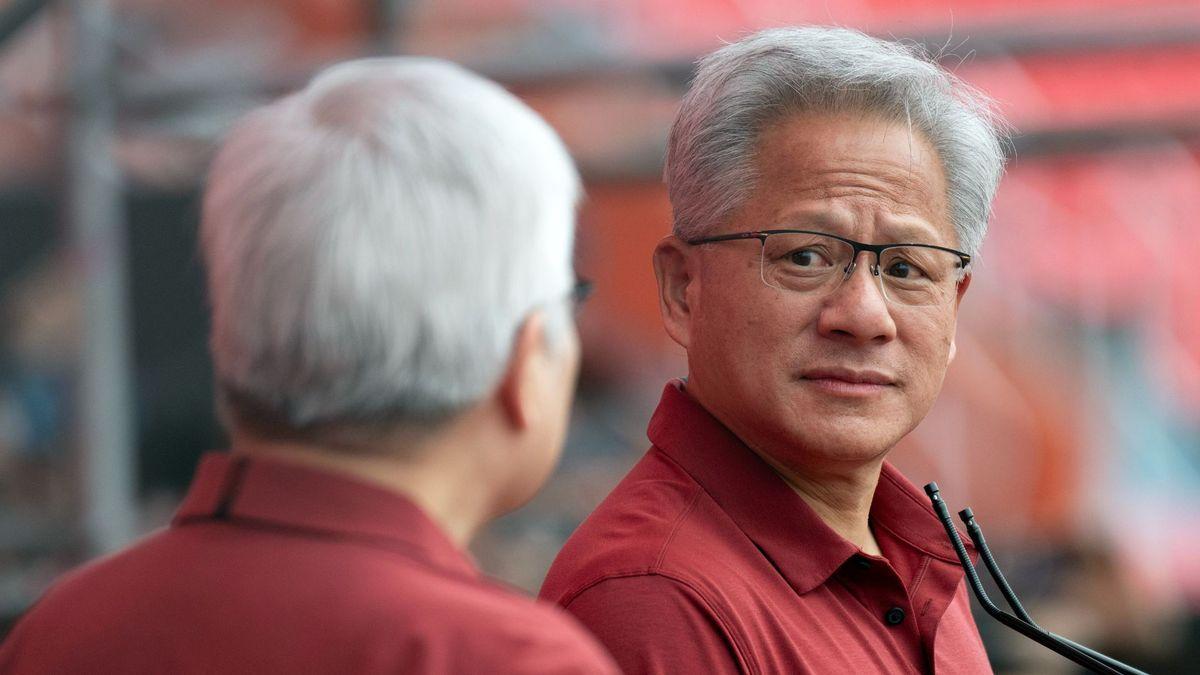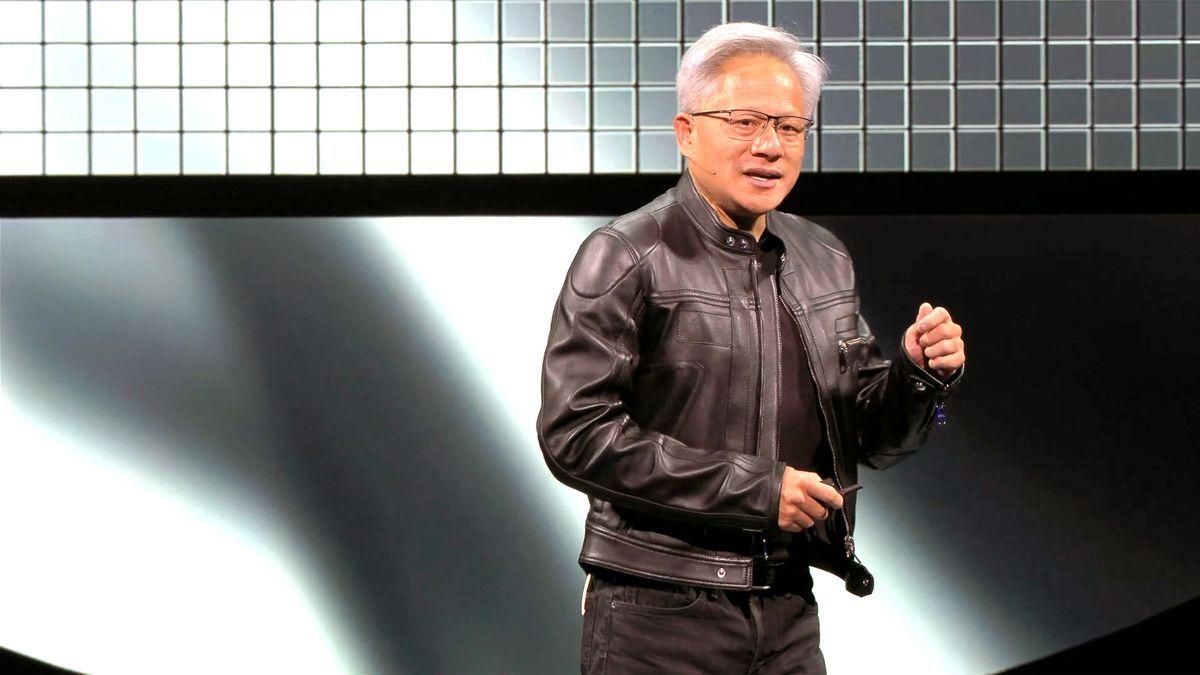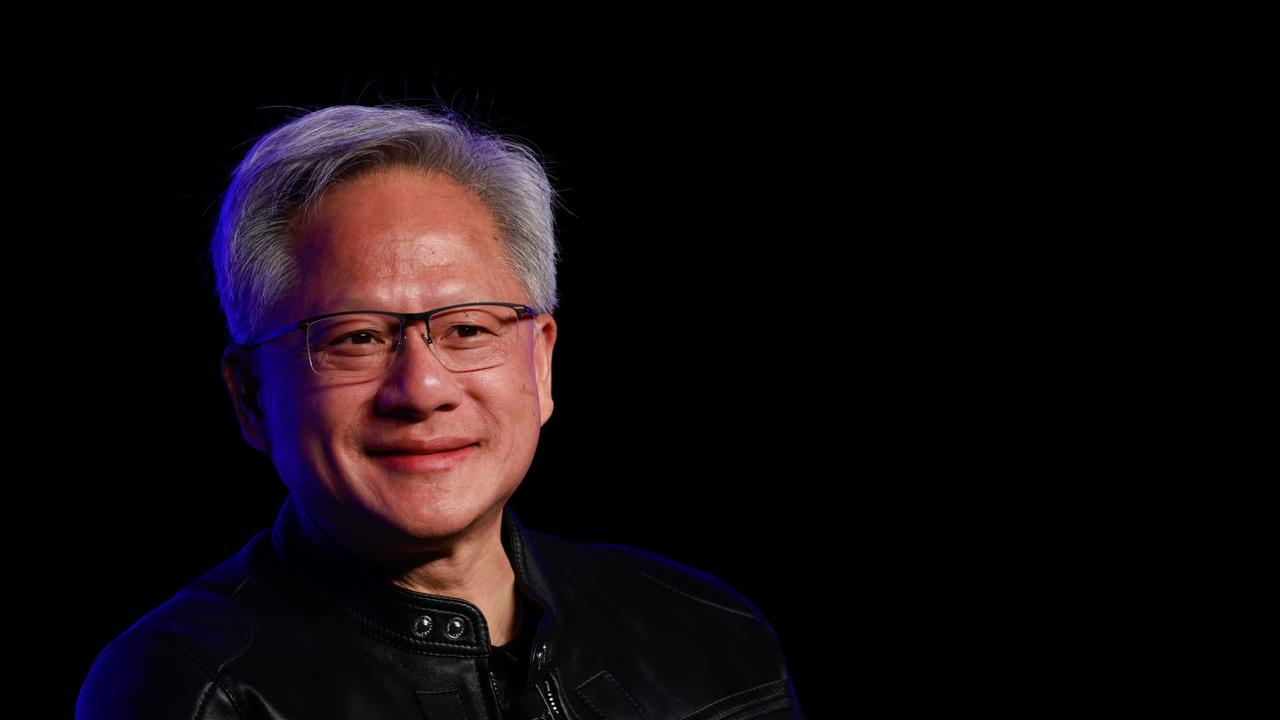Nvidia CEO Jensen Huang Advocates for Personal AI Tutors, Predicting a Future of Enhanced Learning and Productivity
5 Sources
5 Sources
[1]
Nvidia CEO Jensen Huang has a personal AI tutor with him all the time. Here's why he says everyone should opt for it
Nvidia CEO Jensen Huang has a piece of advice that he believes could benefit nearly everyone: Get an AI tutor. Nvidia co-founder recently revealed he always has an AI personal tutor with him and has also advised others to opt for it to be able to use AI tools more effectively. "I have a personal [artificial intelligence] tutor with me all of the time. And I think that feeling should be universal," Huang said in an interview on journalist Cleo Abram's YouTube show, Huge Conversations, in an episode that aired last month. "That AI tutor can just teach you things, anything you like, help you program, help you write, help you analyze, help you think, help you reason," he said. ALSO READ: What did Elon Musk whisper about his job security at Trump's address to Congress? In September, Huang stated in an interview with Salesforce's Marc Benioff that he uses the $20 per month paid version of ChatGPT as his own personal tutor to break problems down and learn more about complex topics. ChatGPT also has a free tier. This tutor is not a human AI expert but an AI-powered virtual assistant. "If there's one piece of advice I'd give to everyone, it's to get an AI tutor immediately," said Huang, whose company manufactures the computer chips driving recent AI developments. In another interview, Jensen shared that he relies on Perplexity's AI-powered search engine as his tutor, describing it as a "really helpful" tool. He mentioned using it daily to explore a variety of topics, including digital biology. "AI programs can teach you anything you want -- help you program, write, analyze, think, and reason. All of these capabilities will empower people, and I believe that's the future," Huang told Abram. He added that within the next decade, AI could significantly enhance learning, making it easier and faster in almost every aspect of daily life. ALSO READ: Elon Musk's DOGE caught inflating its success again as it deletes $4 billion from its 'wall of receipts': Key points "In the next 10 years, intelligence -- while not for everything -- will surpass human capabilities in some areas," Huang predicted. "We're going to become superhumans -- not because we possess superpowers, but because we'll have super AIs," the Nvidia CEO said. He's hopeful, however, that within the next 10 years, the technology will help most people learn more easily and quickly in nearly every kind of daily setting, he told Abram. "I think that [in] the next decade, intelligence -- not for everything, but for some things -- would basically become superhuman," said Huang, adding: "We're going to become superhumans -- not because we have super[powers]. We're going to become superhumans because we have super AIs." ALSO READ: Melania Trump turns head with stunning Dior blazer at Donald Trump's speech to Congress. Check price Huang has a vested interest in promoting AI's value, but the technology's rising popularity may be a double-edged sword. According to an August 2024 Gallup survey, about 75% of Americans worry that AI will eventually lead to fewer jobs for humans. A 2023 report from consulting firm McKinsey estimates that AI could automate nearly half of all human "work activities" as early as 2030. While AI may help employees work more efficiently, the benefits could be short-lived, according to Microsoft AI CEO Mustafa Suleyman. In his 2023 book, "The Coming Wave: Technology, Power, and the Twenty-first Century's Greatest Dilemma," Suleyman argues that AI will initially boost productivity and drive economic growth but will ultimately replace human labor. He warns that the widespread adoption of AI will be "hugely destabilizing" for millions of workers who will need to re-skill and transition to new roles. ALSO READ: 'Liar, Musk steals': Democrats protest Trump's speech as Elon salutes and President touts DOGE's success Unsurprisingly, Huang holds a different view. As Nvidia's CEO, he works alongside thousands of talented employees, but that hasn't made him feel obsolete. "It actually empowers me and gives me the confidence to tackle more ambitious things," he said. Huang believes the same will be true for AI. "Imagine being surrounded by super AIs that excel at specific tasks," he said. "How would that make you feel? It's going to empower you. It's going to make you feel confident.
[2]
Billionaire and one of world's richest man Jensen Huang has this advice for you to improve your life, and he wants people to follow it 'right away'
Nvidia CEO Jensen Huang recommends that everyone get an AI tutor, which can provide instant knowledge and boost productivity. He uses Perplexity's AI-powered search engine daily to stay informed on various subjects. Huang believes AI will enhance human potential and enable higher performance, not replace jobs.With AI taking center stage in the job market, Nvidia CEO Jensen Huang offers a key piece of advice: Get an AI tutor -- something he believes would benefit nearly everyone. "I have a personal artificial intelligence tutor with me all of the time. And I think that feeling should be universal. If there's one thing I would encourage everybody to do, [it's] to go get yourself an AI tutor right away," said Huang told journalist Cleo Abram during YouTube interview show "Huge Conversations," in an episode that aired last month. That's a virtual tutor powered by AI, not a human who can teach you how to use AI more effectively. Huang's go-to AI tutor is Perplexity's AI-powered search engine, which he described as a "really helpful" tool during an interview with the Bipartisan Policy Center last year. He shared that he uses it daily to explore a wide range of topics, including digital biology. Like many generative AI tools, Perplexity offers both free and paid subscription options. Other AI platforms are designed specifically for tutoring, such as Sizzle, a free tutoring service, and Khan Academy's Khanmigo AI tutor, which is available for $4 per month. In an interview on Cleo Abram's YouTube show, Huge Conversations, Huang emphasized the value of Perplexity's AI-powered search engine as a powerful learning tool. He noted that he relies on it daily to deepen his understanding of digital biology and other subjects. Beyond Perplexity, several other AI-based tutoring services exist, such as Sizzle, a free learning assistant, and Khan Academy's AI tutor, Khanmigo, which costs $4 per month. These AI-powered tutors provide training in programming, writing, analysis, and reasoning skills. Nvidia CEO Jensen Huang believes AI is advancing at an unprecedented rate, and future models will require far greater computational power. Speaking to CNBC's Jon Fortt, he explained that next-generation AI models, such as DeepSeek R1, OpenAI's GPT-4, and xAI's Grok 3, require significantly more processing power. "The amount of computation necessary to do that reasoning process is 100 times more than what we used to do," Huang stated. He emphasised that reasoning-based AI is the future, and it will drive even greater demand for Nvidia's high-performance chips. DeepSeek's recent advancements raised concerns over the possibility of achieving similar AI efficiency at a lower cost. However, Huang dismissed the notion that it would reduce demand for Nvidia's chips. "DeepSeek was fantastic," he said. "It was fantastic because it open-sourced a reasoning model that's absolutely world-class."
[3]
Will AI take your job? Nvidia CEO Jensen Huang has a different view -- Here's what he says
Nvidia CEO Jensen Huang advocates for AI tutors, stating they improve learning and empower people. He emphasises AI's role in education and personal growth while dismissing concerns about job losses, stating that AI will make human capabilities better. He recommends platforms such as Perplexity AI and Khanmigo as efficient tools for acquiring knowledge.Nvidia CEO Jensen Huang believes that AI plays a crucial role in education and personal development and could represent the future of learning. He has publicly endorsed this technology, stating that he has a personal artificial intelligence tutor with him all the time. Huang also went on to praise the benefits of having an AI-powered tutor as a personal learning assistant. Huang is not suggesting that humans should teach AI but rather that AI-powered platforms should serve as learning tools. Speaking on Cleo Abram's YouTube show Huge Conversations, he highlighted Perplexity's AI-powered search engine as an invaluable resource for expanding his knowledge on digital biology and other subjects. He said he uses it daily to gain insights and stay informed. Beyond Perplexity, several other AI-based tutoring services exist, such as Sizzle, a free learning assistant, and Khan Academy's AI tutor, Khanmigo, which costs $4 per month. These AI-powered tutors provide training in programming, writing, analysis, and reasoning skills. Also Read : Who was Gene Hackman? Take a look at family, net worth, career of legendary actor As Huang points out, AI programmes can deliver instant knowledge and guidance, boosting confidence and productivity. Huang does not share concerns about robots replacing human jobs. Instead, he believes AI increases human potential. Research by McKinsey suggests that around 45 per cent of current job activities could be automated by 2030, yet Huang remains unconcerned. He sees AI as a tool that will help people learn and develop intelligence that benefits everyone. He predicts that within the next decade, AI will surpass average human intelligence in some areas. But instead of making people obsolete, it will enable them to perform at a higher level, he said. As AI adoption continues to rise, fears of automation and job losses persist. A 2024 Gallup poll found that 75 per cent of Americans worry about machines replacing their jobs. Mustafa Suleyman, Microsoft AI CEO, says that while AI initially improves productivity, it also displaces many conventional jobs. Huang, however, sees things differently. He claims that working alongside intelligent systems does not make him feel redundant; rather, it prepares him to take on more complex challenges. He believes that as AI becomes integrated into daily life, it will instil confidence in people rather than render them obsolete. 1. What AI tutor does Nvidia CEO Jensen Huang recommend? Huang recommends Perplexity's AI-powered search engine as a valuable learning tool. He also acknowledges AI tutoring platforms such as Sizzle and Khan Academy's Khanmigo. 2. How does Jensen Huang view AI's impact on jobs? Huang believes AI will empower individuals rather than replace them, making people more capable and confident rather than redundant.
[4]
Nvidia CEO: 'I would encourage everybody' to use this type of AI -- it's free and can teach you 'anything you like'
Jensen Huang, co-founder and chief executive officer of Nvidia Corp., during a news conference in Taipei, Taiwan, on Tuesday, June 4, 2024. Nvidia CEO Jensen Huang has some advice, and he says that nearly everyone would benefit by following it: Get an AI tutor. "I have a personal [artificial intelligence] tutor with me all of the time. And I think that feeling should be universal," Huang told journalist Cleo Abram's YouTube interview show "Huge Conversations," in an episode that aired last month. That's a virtual tutor powered by AI, not a human who can teach you how to use AI more effectively. "If there's one thing I would encourage everybody to do, [it's] to go get yourself an AI tutor right away," said Huang, whose company makes computer chips that have helped power recent AI tech advances. Huang's preferred tutor is Perplexity's AI-powered search engine, which he called a "really helpful" tool in an interview with the Bipartisan Policy Center last year. He uses it daily to learn about a multitude of subjects, including digital biology, he added. The search engine, like many other generative AI tools, offers users both free and paid subscription options. Other AI platforms are designed to act more specifically as tutors, like free tutoring service Sizzle and Khan Academy's Khanmigo AI tutor, which costs $4 per month. DON'T MISS: How to use AI to be more productive and successful at work "[AI programs can] teach you things -- anything you like -- help you program, help you write, help you analyze, help you think, help you reason," Huang told Abram. "All of those things [are] going to really make you feel empowered and I think that's going to be our future." AI tools come with caveats. They still frequently make factual errors, and experts say you should only use them to help your work -- not to do your work for you. Huang uses his favorite AI tools to write the first drafts of his own work, he said at a Wired event last year. He's hopeful, however, that within the next 10 years, the technology will help most people learn more easily and quickly in nearly every kind of daily setting, he told Abram. "I think that [in] the next decade, intelligence -- not for everything, but for some things -- would basically become superhuman," said Huang, adding: "We're going to become superhumans -- not because we have super[powers]. We're going to become superhumans because we have super AIs."
[5]
'I Feel More Empowered': Nvidia's CEO Uses an AI Tutor to Learn New Topics. Here's Why He Says You Should Too.
Huang said using AI as a tutor can be helpful for programming, learning new concepts, and reasoning. A new Bank of America study from earlier this month noted that technology like AI could displace up to two billion jobs by 2030. Now Nvidia CEO Jensen Huang says that there's one thing he recommends everyone do: Get themselves an AI tutor, or an AI chatbot like ChatGPT that can teach them new material on the spot. "I have [an AI] personal tutor with me all the time," Huang told journalist Cleo Abram last month on an episode of the YouTube interview show "Huge Conversations." "That AI tutor can just teach you things, anything you like, help you program, help you write, help you analyze, help you think, help you reason," he said. In September, Huang stated in an interview with Salesforce's Marc Benioff that he uses the $20 per month paid version of ChatGPT as his own personal tutor to break problems down and learn more about complex topics. ChatGPT also has a free tier. Related: ChatGPT Can Now Complete a Major Task That Would Take a Human Up to 30 Days. Here's How it Works. Huang additionally disclosed in October in an interview with the Bipartisan Policy Center that he also uses Perplexity's AI search engine daily to learn more about subjects like biology. Perplexity costs $20 per month for the professional plan, but users can access the standard plan for free. While Perplexity and ChatGPT are designed for tasks other than tutoring, like in-depth research, other AI platforms are specifically designed to act as personal tutors. Khan Academy's $4 per month Khanmigo chatbot, for example, is advertised as an always-on tutor. "I feel more empowered today, more confident to learn something today," Huang told Abram about AI. "The knowledge of almost any particular field, the barriers to that understanding have been reduced." Huang also told Abram that if he were a student today, he would focus on learning how to interact with AI like Grok, ChatGPT, and Gemini by being able to ask the right prompts. "You can't just randomly ask [AI] a bunch of questions," Huang said. "Asking AI to be an assistant to you requires some expertise and artistry in how to prompt it." Related: Nvidia CEO Jensen Huang's Biggest Worry Shows that Success Has a Downside While AI tools can be useful to learn more about different subjects, they still have a high error rate. According to one independent evaluation from Lars Christian Wiik, a senior software engineer at the AI startup Kindly, OpenAI's GPT-4o had two errors for every 200 responses while Google's Gemini 1.0 Pro had 12 mistakes for every 200 responses. AI could also automate work that takes up more than half of the workday today, according to a 2023 study by consulting firm McKinsey, leading to potential job loss. Goldman Sachs predicted in 2023 that 300 million jobs would be lost or downgraded because of AI. Nvidia is the second largest company in the world at the time of writing, second only to Apple, with a market cap of over $3.2 trillion.
Share
Share
Copy Link
Nvidia CEO Jensen Huang recommends everyone to get an AI tutor, highlighting its potential to revolutionize learning and boost productivity. He uses AI tools daily and believes they will empower individuals rather than replace jobs.

Nvidia CEO Advocates for Personal AI Tutors
Jensen Huang, CEO of Nvidia, has recently been vocal about the transformative potential of AI tutors, urging everyone to adopt this technology. In various interviews, Huang has shared his personal experience with AI-powered learning tools and their impact on his daily life and work
1
2
.The Power of AI Tutors
Huang emphasizes that AI tutors can provide instant knowledge and guidance on a wide range of subjects. He states, "That AI tutor can just teach you things, anything you like, help you program, help you write, help you analyze, help you think, help you reason"
3
. This versatility, according to Huang, makes AI tutors a universal tool that can benefit people across various fields and professions.Huang's Personal AI Toolkit
The Nvidia CEO reveals that he uses several AI tools as part of his learning routine:
- Perplexity AI: Huang uses this AI-powered search engine daily to explore topics like digital biology
2
4
. - ChatGPT: He utilizes the $20 per month paid version to break down complex problems and learn about intricate subjects
1
.
Huang also mentions other AI tutoring platforms like Sizzle (a free service) and Khan Academy's Khanmigo (priced at $4 per month) as valuable resources for learning
4
.AI's Impact on Jobs and Productivity
While concerns about AI replacing human jobs persist, Huang offers a more optimistic perspective. He believes that AI will enhance human potential rather than render people obsolete. "We're going to become superhumans -- not because we have super[powers]. We're going to become superhumans because we have super AIs," Huang predicts
3
5
.However, this view contrasts with some industry forecasts. A Bank of America study suggests that AI could displace up to two billion jobs by 2030
5
. Similarly, a McKinsey report estimates that AI could automate nearly half of all human "work activities" as early as 20301
.Related Stories
The Future of Learning with AI
Huang is confident that within the next decade, AI will significantly enhance learning capabilities. He envisions a future where AI surpasses average human intelligence in some areas, enabling people to perform at higher levels
2
3
.Challenges and Considerations
Despite his enthusiasm, Huang acknowledges that effectively using AI tools requires skill. He advises, "You can't just randomly ask [AI] a bunch of questions. Asking AI to be an assistant to you requires some expertise and artistry in how to prompt it"
5
.It's also important to note that current AI tools have limitations. They can make factual errors, and experts recommend using them as aids rather than replacements for human work
3
.As AI continues to evolve, its impact on education, work, and daily life remains a topic of intense discussion and speculation. While Huang presents an optimistic view of AI's potential to empower individuals, the broader implications for the job market and society at large are still unfolding.
References
Summarized by
Navi
Related Stories
Nvidia CEO Jensen Huang Advocates for AI Proficiency in Education and Career Development
18 May 2025•Technology

Nvidia CEO Jensen Huang Pushes for Maximum AI Automation While Promising Job Security
25 Nov 2025•Business and Economy

Nvidia CEO Jensen Huang Weighs In on AI's Impact on Jobs and Innovation
14 Jul 2025•Technology

Recent Highlights
1
ByteDance Faces Hollywood Backlash After Seedance 2.0 Creates Unauthorized Celebrity Deepfakes
Technology

2
Microsoft AI chief predicts artificial intelligence will automate most white-collar jobs in 18 months
Business and Economy

3
Google reports state-sponsored hackers exploit Gemini AI across all stages of cyberattacks
Technology





